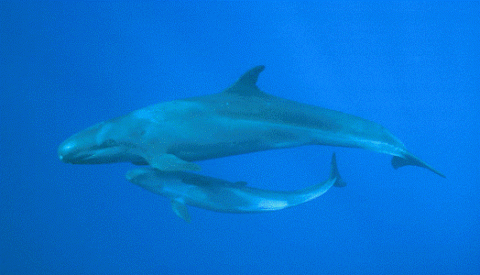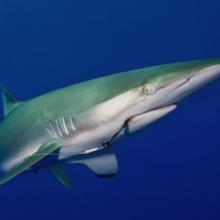
In July, the National Marine Fisheries Service (NMFS) posted the Draft False Killer Whale Take Reduction Plan, which proposes new regulations to protect false killer whales in Hawaii, which are currently being considered for listing as endangered under the Endangered Species Act. The Hawaiian false killer whale population has drastically declined over the last two decades. The inshore population is only around 120 individuals, while the pelagic population is slightly larger, around 480. The main threat that faces false killer whales is being accidentally killed or injured by the Hawaiian longline fishery. Each year, an estimated 8 individuals from these two populations are killed or seriously injured due to being caught in the longline fishery. That doesn't seem like many, but because the populations are so small, taking a few individuals each year prevents their populations from increasing to a sustainable level.
Among the regulatory measures to reduce false killer whale takes, NMFS is recommending that "weak" circle hooks, sized 16/0 or smaller, be required in the Hawaii-based deep-set longline fishery. "Weak" hooks are designed to retain the target catch, but release larger bycatch, like false killer whales (or bluefin tuna in the Gulf of Mexico or pilot whales in North Carolina). The hooks release larger animals by straightening out when the animal puts tension on the line.
David Kerstetter, a Research Scientist at the Nova Southeastern University Oceanographic Center, has been working with the Consortium, NMFS, and longliners to test "weak" hooks in the Hawaiian longline fishery to determine their effectiveness for releasing false killer whales and retaining the target catch, big-eye tuna. Dr. Kerstetter is also working with the Consortium to test "weak" hooks in the North Carolina longline fishery to reduce pilot whale bycatch. His research has shown that there is no significant difference in target catch rates or weights between traditional hooks and "weak" hooks. Because false killer whale bycatch events are so rare, NMFS is making the recommendation for "weak" hook use based on their ability to retain tuna, and expects positive reduction in the severity of injuries to false killer whales.
You can find more information on the proposed regulations at the Federal Register.
Photo credit: NOAA
Featured Bycatch Species

The dusky shark is currently listed as Vulnerable by the IUCN, but populations continue to decline.
